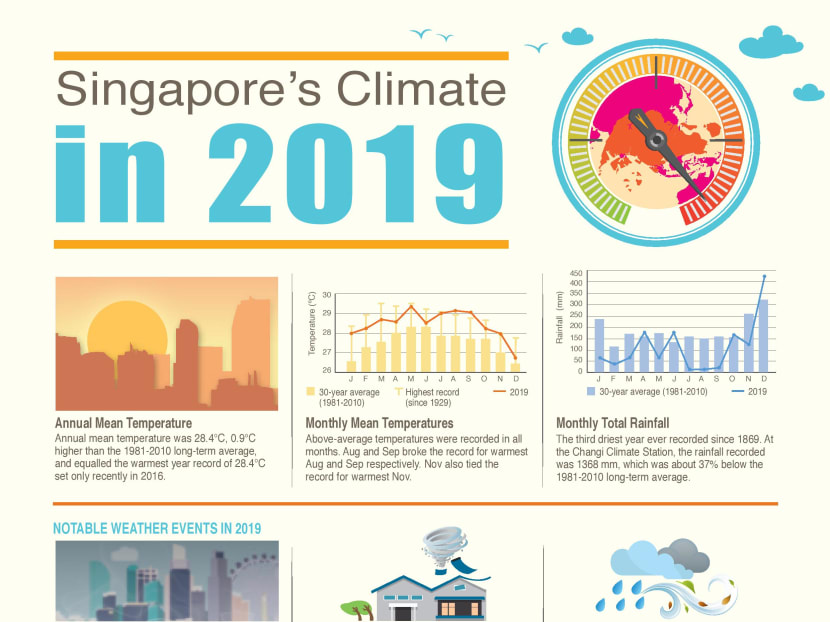With hotter-than-usual months, 2019 tied with 2016 to be warmest year by far
SINGAPORE — The past 23 months have been hotter than usual in Singapore, the Meteorological Service Singapore (MSS) said in a media release on Thursday (Jan 16).

In Singapore, 2019 was the third driest year since 1869, with below-average rainfall recorded at most climate stations across the island.
SINGAPORE — The past 23 months have been hotter than usual in Singapore, the Meteorological Service Singapore (MSS) said in a media release on Thursday (Jan 16).
Temperatures of each month since February 2018 were hotter than the typical mean monthly temperatures.
Last year also saw the hottest August and September on record, with temperatures of 29.1°C and 29°C respectively. And November met the record for the hottest November at 28°C.
HOTTEST AND THIRD DRIEST YEAR
Last year tied with 2016 for the warmest year on record, with the mean temperature for 2019 at 28.4°C.
It was 0.9°C higher than yearly temperatures between 1981 and 2010.
Following closely behind the 2019 and 2016 joint warmest years are 2015, 1998 and 1997 as the joint-third warmest years at 28.3°C, ever since temperature records began in 1929.
The average temperature of the past decade also rose to 27.94°C, surpassing the previous warmest decade from 2009 to 2018 which registered 27.89°C.
These temperature trends generally coincide with data from the World Meteorological Organisation’s Statement on the State of the Global Climate in 2019, which confirmed that last year was the second warmest year on record globally.
In Singapore, it was also the third driest year since 1869, with below-average rainfall recorded at most climate stations across the island.
At the Changi station, the annual rainfall recorded was 1,368mm, which is 37 per cent below yearly rainfalls between 1981 and 2010.
THE INDIAN OCEAN’S INFLUENCE
The drier and warmer weather in Singapore from June to September last year was greatly influenced by one of the “strongest” positive Indian Ocean Dipole events in past 60 years, MSS said.
An Indian Ocean Dipole refers to the difference in sea-surface temperatures at opposite ends of the Indian Ocean.
A positive measure means that the eastern Indian Ocean — where Singapore is located — has cooler sea temperatures than the western region.
This led to the below-average rainfall and higher temperatures in the third quarter of last year.
EXTREME WEATHER EVENTS
The drier weather created by Indian Ocean Dipole, coupled with the intrusion of a dry air mass from high-pressure systems over the Australian continent, contributed to the significantly drier-than-normal conditions not just in Singapore but in southern Southeast Asia during the Southwest Monsoon season.
The transboundary haze that lasted for several days in September was caused by smoke that wafted from persistent land and forest fires in Indonesia, namely the states of Sumatra and Kalimantan, MSS said. And the dry conditions escalated the fires.
During that period, the 24-hour Pollutant Standard Index (PSI) in Singapore hit the high end of the Moderate and Unhealthy ranges. The PSI peaked at 154 in the south of Singapore on Sept 19.
Singapore also had its first recorded landspout on Sept 27 at Gul Way near Tuas, caused by intense thunderstorm clouds.
A landspout is a spinning column of air that hovers over land, stretching up to the developing clouds above it.
In the first half of December, Singapore also experienced the longest Northeast Monsoon surge in the past 10 years.
Lasting seven days from Dec 9 to 15, the monsoon surge brought showers over many parts of the island. Daily temperatures during that period ranged from 22°C to 29.9°C.










